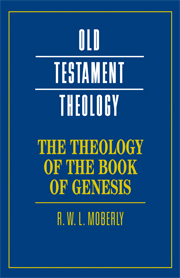Book contents
- Frontmatter
- Contents
- General Editors' Preface
- Preface
- List of Abbreviations
- 1 WHAT IS A “THEOLOGY OF GENESIS”?
- 2 ON READING GENESIS 1–11
- 3 GENESIS 1: PICTURING THE WORLD
- 4 GENESIS 2–3: ADAM AND EVE AND “THE FALL”
- 5 GENESIS 4: CAIN AND ABEL
- 6 GENESIS 6–9: CATACLYSM AND GRACE
- 7 ON READING GENESIS 12–50
- 8 GENESIS 12:1–3: A KEY TO INTERPRETING THE OLD TESTAMENT?
- 9 GENESIS 12:3A: A BIBLICAL BASIS FOR CHRISTIAN ZIONISM?
- 10 GENESIS 22: ABRAHAM – MODEL OR MONSTER?
- 11 ABRAHAM AND THE “ABRAHAMIC FAITHS”
- 12 GENESIS 37–50: IS JOSEPH WISE?
- Further Reading
- Author Index
- Scripture Index
- Subject Index
10 - GENESIS 22: ABRAHAM – MODEL OR MONSTER?
Published online by Cambridge University Press: 05 June 2012
- Frontmatter
- Contents
- General Editors' Preface
- Preface
- List of Abbreviations
- 1 WHAT IS A “THEOLOGY OF GENESIS”?
- 2 ON READING GENESIS 1–11
- 3 GENESIS 1: PICTURING THE WORLD
- 4 GENESIS 2–3: ADAM AND EVE AND “THE FALL”
- 5 GENESIS 4: CAIN AND ABEL
- 6 GENESIS 6–9: CATACLYSM AND GRACE
- 7 ON READING GENESIS 12–50
- 8 GENESIS 12:1–3: A KEY TO INTERPRETING THE OLD TESTAMENT?
- 9 GENESIS 12:3A: A BIBLICAL BASIS FOR CHRISTIAN ZIONISM?
- 10 GENESIS 22: ABRAHAM – MODEL OR MONSTER?
- 11 ABRAHAM AND THE “ABRAHAMIC FAITHS”
- 12 GENESIS 37–50: IS JOSEPH WISE?
- Further Reading
- Author Index
- Scripture Index
- Subject Index
Summary
Some of the central problems of theological interpretation posed by changing attitudes toward the Bible in general, and Genesis in particular, are focused with unusual clarity on the famous story of Abraham's near sacrifice of Isaac, often known by its Hebrew name, the Akedah (Gen 22:1–19).
Traditionally, Jews and Christians have read this story as displaying costly right response to God on the part of both Abraham and Isaac. In the New Testament, for example, Abraham is seen to demonstrate the kind of engagement with God that is called “faith” in a Christian context. James argues that Abraham shows that genuine faith entails a total lived-out responsiveness to God (James 2:14–26), while the writer to the Hebrews sees Abraham as a model of faith in the sense of trusting God for a future as yet unseen (Heb 11:1, 17–19). For both these writers, the significance of Abraham for believers is well summarized by the words of Jesus in John's portrayal: “If you are Abraham's children, then do what Abraham did” (John 8:39).
There is also a long history of reading Paul as alluding to Genesis 22 when he speaks of God “not sparing his own son” (Rom 8:32), in a way that sets up a potent imaginative link (a typology or figuration) between Isaac and Jesus, a link that has often been developed in the history of interpretation.
- Type
- Chapter
- Information
- The Theology of the Book of Genesis , pp. 179 - 199Publisher: Cambridge University PressPrint publication year: 2009

